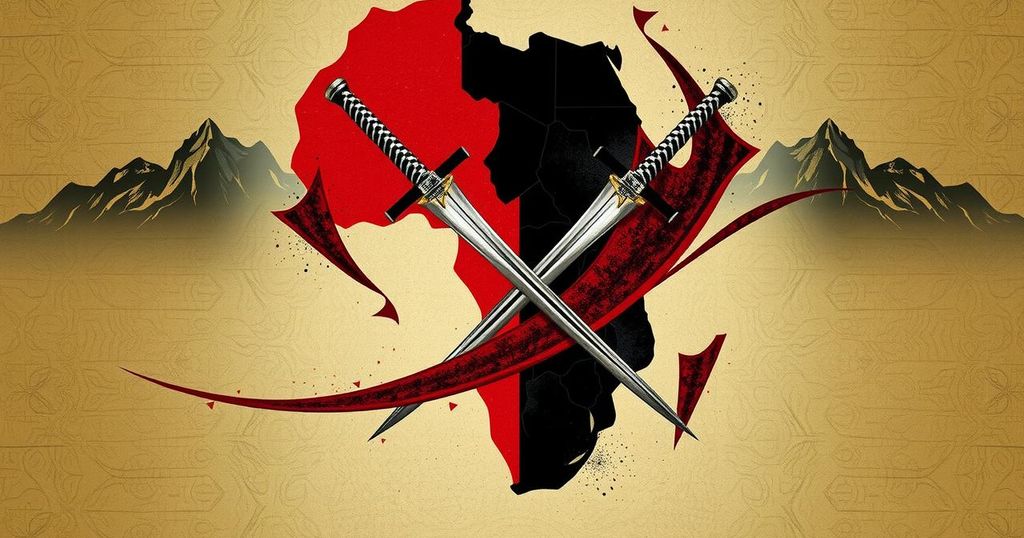Diplomatic tensions between South Africa and Rwanda have escalated, particularly after President Ramaphosa accused the Rwanda-backed M23 rebels of killing South African peacekeepers in the DRC. With 13 South African soldiers reportedly killed, the situation risks further deterioration as both nations exchange accusations. The role of South Africa in regional peacekeeping and its declining military capabilities has become a critical point of discussion, raising questions about the effectiveness of ongoing operations in the volatile region.
Tensions between South Africa and Rwanda escalated following President Cyril Ramaphosa’s accusations regarding the Rwanda-backed M23 rebel group, which he claimed was responsible for the deaths of South African peacekeepers in the Democratic Republic of the Congo (DRC). As the M23 captured Goma, South Africa issued a warning, stating that any further attacks on its troops would be treated as a “declaration of war”.
In response, President Paul Kagame of Rwanda accused South Africa of participating in offensive operations to support the Congolese government against its own people. Since the outbreak of hostilities last week, 13 South African soldiers have been killed as the M23 rebels advanced towards the strategically important Goma region. Previous incidents in 2022 also resulted in South African casualties, marking significant loss in the area.
Historically, the relationship between South Africa and Rwanda has been contentious, with previous diplomatic spats including the expulsion of diplomats from both nations in 2014 after an attack on a Rwandan dissident. Although relations improved following Ramaphosa’s visit to Rwanda for genocide commemorations, tensions reignited due to the recent fatalities among South African troops deployed in the DRC as part of a regional peacekeeping mission.
President Ramaphosa confirmed that both nations had discussed the escalating conflict and agreed on the pressing need for a ceasefire. He emphasized that the presence of South African troops did not represent a declaration of war against any country, implicitly referring to Rwanda. However, the defense minister indicated that any attack on South African forces would be seen seriously, calling it a warning of potential confrontation.
The conflict further escalated as Ramaphosa stated that an M23 attack, allegedly involving the Rwanda Defense Force (RDF), led to South African casualties, which enraged Kagame. Kagame rejected the label of militia for the RDF and accused South Africa of fabricating claims about the situation. He asserted that the presence of regional peacekeepers alongside armed groups posed a threat to Rwanda.
Kagame’s remarks underscore his demands for South Africa to reconsider its military involvement in the DRC. South Africa’s military history in the region, dating back to the late 1990s, reflects its broader strategic interests, particularly regarding the profitable mineral resources of the DRC. Despite its peacekeeping objectives, South Africa’s declining military capabilities have compounded its challenges in the region.
As the South African military faces operational difficulties, questions emerge over the viability of its ongoing engagement in the DRC. The Southern African Development Community (SADC) holds the ultimate authority over troop decisions. Determining whether to maintain or withdraw South African forces will require careful consideration of the ongoing risks versus national interests.
The relationship between South Africa and Rwanda has long been complex, marked by diplomatic tensions and military involvement in the DRC. Both nations are part of the Southern African Development Community (SADC), which coordinates regional peacekeeping efforts. Recent escalations in violence by the M23 rebel group, allegedly receiving support from Rwanda, have reignited historical grievances and calls for action from both countries’ leaderships. The involvement of South African troops since 2023, against a backdrop of a deteriorating military budget and equipment, presents ongoing challenges for the nation in maintaining its peacekeeping commitments.
The ongoing diplomatic spat between South Africa and Rwanda highlights the precarious nature of their relationship amidst the conflict in the DRC. With significant South African military losses and Rwanda’s counter-accusations, the situation necessitates urgent attention from both nations. The SADC’s forthcoming decisions regarding military presence will greatly shape the future of regional stability and the effectiveness of peacekeeping operations in the DRC, an area rich in resources yet plagued by unrest.
Original Source: www.bbc.com






